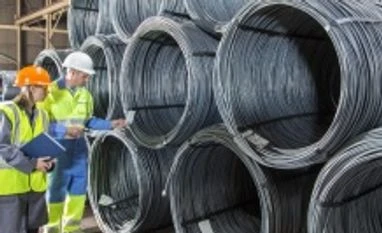Klesch Group, the Switzerland-based company involved in industrial commodities business, has signed a memorandum of understanding with a view to purchase the Long Products Europe business and associated distribution activities from Tata Steel. Both parties have now entered a period of exclusive detailed due diligence with the objective of completing the transaction in the first half of 2015.
The memorandum covers several UK-based assets including Tata Steel’s Scunthorpe steelworks, mills in Teesside, Dalzell and Clydebridge in Scotland, an engineering workshop in Workington and a rail consultancy in York, as well as other operations in France and Germany. About 6,500 people are employed at Long Products Europe and its distribution facilities.
Explaining the context and rationale for this decision, Karl Koehler, Chief Executive of Tata Steel’s European operations, said, “We are making huge strides on our strategic journey to become a premium, customer-centred steel company thanks to investment in equipment, technology and customers, together with the substantial contributions from our employees. We have improved the competitiveness of Tata Steel’s European operations, including Long Products Europe.”
Long Products Europe produces a wide range of standard and differentiated products including sections, rails, wire rods, special profiles and plates for the rail, yellow goods, energy and construction sectors.
Koehler added, “Accelerating the pace of innovation on advanced steel solutions, helping our customers succeed in their markets and creating a sustainable asset base requires significant capital and expertise. We have therefore decided to concentrate our resources mainly on our strip products activities, where we have greater cross-European production and technological synergies.”
The European steel industry is emerging from one of the most challenging economic periods in its history. Tata Steel has invested Pound 1.2 billion in its UK operations and trained 1,200 UK apprentices and graduates since acquiring Corus in 2007.
Experts believe that Tata Steel’s move to sell Long Products Europe will have positive impact on the company’s financial performance. Dr Sourindra Banerjee, Warwick Business School Assistant Professor of Marketing, said, “The decision by Tata Steel to sell its Long Products Division has nothing to do with the financial health of Tata Steel as a company. Tata Steel is actually in good financial health with estimates that point towards better financial performance in the next couple of years. Tata Steel Europe’s decision to sell off its Long Products Division is in line with its strategy to move up the value chain by providing differentiated, innovative and premium steel solutions for its customers.”
Stating that such a strategy has its upsides and downsides, he said, “The upside is higher profitability and greater sustainability in a highly cost competitive business. The downside is business units which are unable to produce differentiated, innovative and premium steel solutions for its customers need to be trimmed.”
The memorandum covers several UK-based assets including Tata Steel’s Scunthorpe steelworks, mills in Teesside, Dalzell and Clydebridge in Scotland, an engineering workshop in Workington and a rail consultancy in York, as well as other operations in France and Germany. About 6,500 people are employed at Long Products Europe and its distribution facilities.
Explaining the context and rationale for this decision, Karl Koehler, Chief Executive of Tata Steel’s European operations, said, “We are making huge strides on our strategic journey to become a premium, customer-centred steel company thanks to investment in equipment, technology and customers, together with the substantial contributions from our employees. We have improved the competitiveness of Tata Steel’s European operations, including Long Products Europe.”
Long Products Europe produces a wide range of standard and differentiated products including sections, rails, wire rods, special profiles and plates for the rail, yellow goods, energy and construction sectors.
Koehler added, “Accelerating the pace of innovation on advanced steel solutions, helping our customers succeed in their markets and creating a sustainable asset base requires significant capital and expertise. We have therefore decided to concentrate our resources mainly on our strip products activities, where we have greater cross-European production and technological synergies.”
Also Read
The European steel industry is emerging from one of the most challenging economic periods in its history. Tata Steel has invested Pound 1.2 billion in its UK operations and trained 1,200 UK apprentices and graduates since acquiring Corus in 2007.
Experts believe that Tata Steel’s move to sell Long Products Europe will have positive impact on the company’s financial performance. Dr Sourindra Banerjee, Warwick Business School Assistant Professor of Marketing, said, “The decision by Tata Steel to sell its Long Products Division has nothing to do with the financial health of Tata Steel as a company. Tata Steel is actually in good financial health with estimates that point towards better financial performance in the next couple of years. Tata Steel Europe’s decision to sell off its Long Products Division is in line with its strategy to move up the value chain by providing differentiated, innovative and premium steel solutions for its customers.”
Stating that such a strategy has its upsides and downsides, he said, “The upside is higher profitability and greater sustainability in a highly cost competitive business. The downside is business units which are unable to produce differentiated, innovative and premium steel solutions for its customers need to be trimmed.”
)